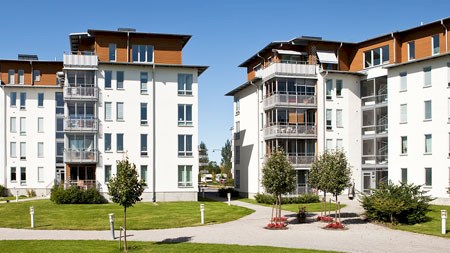Real estate deals are everywhere. In a normal day you probably pass at least a few possible investments just going about your daily routine. Some you may have noticed, some of you may not have. But once you start seriously looking, you'll be surprised what is out there.
Once you start viewing the world through an investor's eyes," For Sale" signs suddenly catch your interest. A "For Rent" sign can lead to a simple phone call to see if the owner of the property might want to sell. A glance at the newspaper shows property for sale by individual owners and real estate agents. Acquaintances might know a friend with a property to unload. When you embark on your real estate career the problem is not finding the deals, but rather determining which deals are best for you.Of course you will take price into consideration, but this should never be your only criterion. Don't just focus on bargains. A low price means nothing if you can't manage or sell that property for a profit.If you are investing in real estate to turn over for a profit, price is hugely important. You will be targeting property that you can sell for more than you paid. But if you are looking at property to rent and manage, the deciding factor may not be the asking price but the terms of the sale. With rental properties, you must constantly guard against negative cash flow (unless you are wealthy and want the tax write off). And that means keeping vacancies to minimum.
Know Your Goals Knowledge is power. Knowledge of yourself is an important but often overlooked key to your plan. Do you know yourself? Do you know the level of stress with which you will be comfortable? Do you prefer working with families or businesses? Do you like working 9 to 5? Are you comfortable seeking entrepreneurial help for your answers to these questions and others can help you determine where to put your investment energies. Again, don't just look for the lowest price. Go into the investment business with your eyes open. Have a plan.
Planning is a tricky business. A good plan takes into account worse scenarios, best case scenarios and coping mechanisms. It must at once encompass the passion that lasts for long haul and the flexibility that allows to change. It means knowing yourself, knowing your finances and knowing your market.
Know your finances. Make a spreadsheet of your bills, your income; you're your discretionary income. How much can you realistically afford for a down payment? How much can you realistically afford for a mortgage payments? What cushion do you have in the event of vacancies?You must also know what you want before you go looking for property to buy. If you want to rent single -family units to families, don't buy a bargain-basement home with no yard in a gang-infested neighbourhood. If you want to manage a high -end office unit for professionals, don't buy an absolute concrete building in the industrial section outside town.It is important to think through all your goals before you even view a property. You want to be sure that emotions don't enter into choice. You might be tempted by a paint job or a low price or even property that reminds you of happy times in your life. Leave your personal preferences, biases, greed and nostalgia at the door. This is business.
Choosing the right property Once you cover these bases, the next step is to take a swing. Many an investor has been waylaid by the inability to make a decision. If you want to make money in real estate, you will eventually have to make an offer. There's no way of getting around it. So do your research, make your plan, reduce your risk through knowledge and foresight, take a deep breath and dive in. The first offer is always the hardest. With each subsequent offer you fear should decrease as your knowledge increases, but you still have to take this first step.
Types of Investments. Commercial, residential, industrial, single-family homes, multi-tenant apartment complexes, college dorms, small office complexes, business parks, warehouses, industrial parks, single-use businesses, strip malls, community centres, build- to-suit, renovations, speculation-there are more ways to invest in real estate than could possibly be covered in one book. So we'll look at a few of the more common options open to you.
Speculation There are several ways to speculate on property, including flipping properties. Certain strategies involve taking advantage of lengthy close or purchasing options to buy to allow the property to increase in value through such events as rezoning or community growth. You can then assign your option roll over your property to the next investor.Purchasing options takes forward-thinking and no small amount of luck, but the returns can be significant. So how does it work? It's pretty simple in theory. You make an offer for a parcel of land that you feel pretty sure is in the path of development. You pay for an option and agree to annual payment extensions on that option. This ends up being much less than outright purchase. If you're right on where the growth is heading, you can make big money. I f you're wrong, you lose your money and don't even have the land to show for it.
Real Estate Investment and Management For a less risky venture, you might want to look at a simple long-term investment property. In this scenario, you buy a property and then just hold onto it enjoys the positive cash flow. When the value increases enough you may consider selling.Income property can be single-tenant or multi-tenant. The management involved is obviously quite different, so consider which toy want to buy as an investment carefully, taking into account your personality and preferences. The tenant's rental contract requirements can run the gamut of full responsibility for all operating cost whatsoever. The former is frequently a single tenant building with a tenant with an impeccable credit, while the latter can be either single-tenant or multi-tenant.Income property can be residential, commercial, industrial or even mixed use. Multi-tenant buildings are more common. The more "multi" the better. More tenants means less risk, even though it also means more management. The goal is to be sure that no one tenant accounts for a significant percentage of your occupancy. If one tenant takes up half your building and decides to leave, you lose half your income. But if tenant accounts for a only five percent of your occupancy, you only lose five percent of your income. The difference between five percent and a 50 percent vacancy can be the difference between profit and loss for your property. Once again it all comes down to numbers.
Location. There are a variety of criteria to consider when deciding to target an area for investment consideration. Do you want to invest in rental property or property you will sell for a profit? Are you interested in residential or commercial property? Where is demand the highest for that sort of property? If renting, who is your ideal renter? Do you want to live near your rental property (where it is easy to travel for repairs, but where complaint calls are likely to be frequent) or far.However, knowing the "what" is only half the battle. You also need to know the "where". When you invest in a property, you invest in an area, a market. So you'd better understand all there is to understand about the market:
How big is the population?
What is the area's growth rate?
What is the area's median income?
What is the area's education level?
What are the primary industries?
Is the market growing or shrinking?
Where are the high end properties?
Where are the low end properties?
Where are the jobs?
Where are the best shopping and entertainment centres?
In which direction is the area sprawling?
Which areas are suffering from high turnover?
Are new transportation corridors in the offing?
What are the absorption rates for commercial and residential areas?
Where is the overall national economy on its gravitational cycle?
What effect is the current global market having on jobs, land and the overall economy?
How does the area compare, statistically, to other areas of similar size?
Market information is available from the municipalities, chambers of commerce, real estate professionals, banks and lenders, industry publications like REIM and sellers themselves. If you don't want to gather the information yourself, there are marketing firms like SAPTG all over the country who specialize in such searches. However, as always, let the experts get you the data and then come to your own conclusions. Take their recommendations you pay for will, by their nature, be conservative. Consultants tend toward the middle of the road to protect them and make themselves attractive to the highest number of clients. For you to succeed in this business, you need to stray from the herd mentality and forge your own way.


